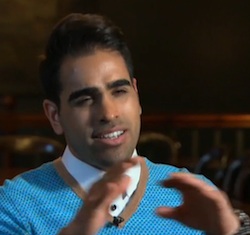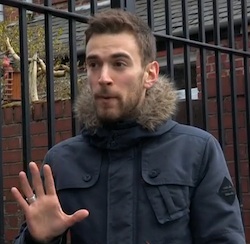Young people’s mental health: failed by the system
Last night there was a documentary on BBC Three about young people whose mental health conditions went untreated for months or years by the NHS mental health services, including in cases where they were experiencing severe psychosis and were at risk of killing themselves. The programme was part of the same “It’s a Mad World” season as Don’t Call Me Crazy, which I reviewed here three weeks ago, and the presenter, Jonny Benjamin, suffers from schizoaffective disorder and has been running a YouTube channel about his conditions (he also has Crohn’s disease) for three years and works for a TV production company (he is interviewed by Mind’s Time to Change here). As great as this documentary was, the title feeds into a media culture of blaming “the NHS” for things that are wrong with the health system, and plays into the hands of those who want to destroy or privatise it.
Jonny interviewed a number of young people who had various mental health problems including bipolar disorder, chronic anxiety and OCD, several of whom had found difficulty accessing services at all or been treated inappropriately. He identified three main areas — GPs, Accident and Emergency and the Child and Adolescent Mental Health Services (CAMHS) themselves — as places where oversights and serious mistakes are made. He spoke to a family whose son had killed himself after repeatedly trying and failing to get treatment for his suicidal thoughts, to a man with OCD who had a serious crisis after being over-prescribed fluoxetine (Prozac) by a GP, to a woman with an eating disorder who had been in several hospitals and had only been treated for her weight loss, not for her underlying condition, and a woman who had been given an appointment with CAMHS which fell four days after her 18th birthday, was refused the service and had to beg to be seen. He himself spent time in a private psychiatric unit but felt he wasn’t getting better, and ran away and nearly killed himself. Many of them had been left to deal with their problems on their own, and in some cases their lives were saved by the intervention of friends or even strangers rather than by professionals.
 Towards the end of the programme, he interviewed Dr Ranj Singh from the South London Healthcare NHS Trust, who made the point that “everything requires funds”, that there are cuts being made everywhere and thresholds and referral criteria are changing and that the people who suffer because of that are the patients that need the greatest care. However, that does not wholly explain incidents of incompetence, such as over-prescribing a potent anti-depressant, and attitudes towards teenage mental health may play a part in refusal of treatment or inappropriate treatment, such as that it’s just teenage hormones or over-reaction. We already know that such attitudes result in people (children, teens and adults) being treated for non-existent mental health conditions when they were in fact physically ill, so we cannot blame funding for health professionals’ attitudes, although changing them would require training, and thus funding.
Towards the end of the programme, he interviewed Dr Ranj Singh from the South London Healthcare NHS Trust, who made the point that “everything requires funds”, that there are cuts being made everywhere and thresholds and referral criteria are changing and that the people who suffer because of that are the patients that need the greatest care. However, that does not wholly explain incidents of incompetence, such as over-prescribing a potent anti-depressant, and attitudes towards teenage mental health may play a part in refusal of treatment or inappropriate treatment, such as that it’s just teenage hormones or over-reaction. We already know that such attitudes result in people (children, teens and adults) being treated for non-existent mental health conditions when they were in fact physically ill, so we cannot blame funding for health professionals’ attitudes, although changing them would require training, and thus funding.
I think the choice of title was unfortunate, because right now the media is full of horror stories about NHS hospitals, at a time when, not coincidentally, there is a Tory government which is looking to privatise whole sections of it. As Sue Marsh, who has been an NHS service user most of her life because of a severe case of Crohn’s disease, wrote recently, she had been trying to raise awareness of poor patient care in some British hospitals for years, having experienced a lot of it herself, but nobody cared until a Tory government wanted to privatise it. It is possible to hate cruelty and poor care (thought there were no cases of actual abuse discussed in this programme) while still appreciating the NHS. As I commented: the NHS is a funding model, in which healthcare is funded out of general taxation rather than by private insurance as in the USA (unless you happen to be elderly or a disabled person lucky enough to get a Medicaid waiver), and we need to separate the idea of the NHS from the practices of particular health trusts, doctors or hospitals. Without the NHS, we would still be refused care on funding grounds, such as if we did not have the right insurance, and still have the same problems with abusive or dismissive healthcare professionals, only we would have to pay for their ‘services’ upfront. This programme should not have been called “Failed by the NHS” anyway as one of the cases discussed involved a private hospital, and the NHS services’ failures were partly because of lack of funds. “Failed by the System” would have been a better title.
Possibly Related Posts:
- Rosie Jones: Am I a Ret*rd, reviewed
- Who really “hates the NHS”?
- Why are children in care being sent miles from home?
- Review: Farha
- This scandal has already broken

